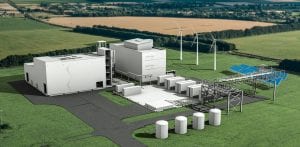
The Schwarzheide battery recycling prototype plant will use innovative technology for extracting lithium, nickel, cobalt and manganese from end-of-life lithium-ion batteries and production scrap. (Source: BASF)
BASF SE (Ludwigshafen, Germany) will build a battery recycling prototype plant in Schwarzheide, Germany, at the site of its cathode active materials (CAM) plant. The prototype recycling plant will allow for the development of operational procedures and optimization of technology to deliver superior returns of lithium, nickel, cobalt and manganese from end-of-life lithium-ion batteries as well as off spec material from cell producers and battery material producers. With the expected rapid growth of the electric vehicle market, recycling provides competitive and sustainable access to relevant metals for cathode active materials. The extracted metals will be used to produce new cathode active materials and will enable a circular economy for the battery value chain.
“With this investment in battery recycling, plus leading process technology for manufacturing of cathode active materials, we aim to ‘close the loop’ while reducing the CO2 footprint of our cathode active materials by up to 60 percent in total compared to industry standards,” said Dr. Matthias Dohrn, Senior Vice President, Precious and Base Metal Services at BASF. “This will enable us to meet the needs of our automotive OEM customers and helps ensure a more sustainable future for us all.”
This investment will create about 35 new production jobs, with startup planned for early 2023. Battery recycling is an important long-term market requirement in the electric vehicle market to reduce its CO2 footprint, as well as to meet stricter policy measures, expected under the proposed EU Battery Regulation, including recycling efficiencies and material recovery targets for nickel, cobalt and lithium.
The Schwarzheide production site is based in Eastern Germany in the federal state of Brandenburg. The investment in Schwarzheide reinforces BASF’s support of the European Commission’s agenda towards a European battery production value chain and is part of the “Important Project of Common European Interest (IPCEI)” approved by the European Commission on December 9, 2019, under the European Union State aid rules. The launch of innovative battery materials from the Schwarzheide plant and research to develop next-generation battery materials and process development, including battery recycling, is funded by the Federal Ministry of Economics and Energy on the basis of a resolution of the German Bundestag and by the Ministry of Economics, Labor and Energy of the State of Brandenburg on the basis of a resolution of the Brandenburg State Parliament as part of the IPCEI for Batteries: Funding codes 16BZF101A/B.